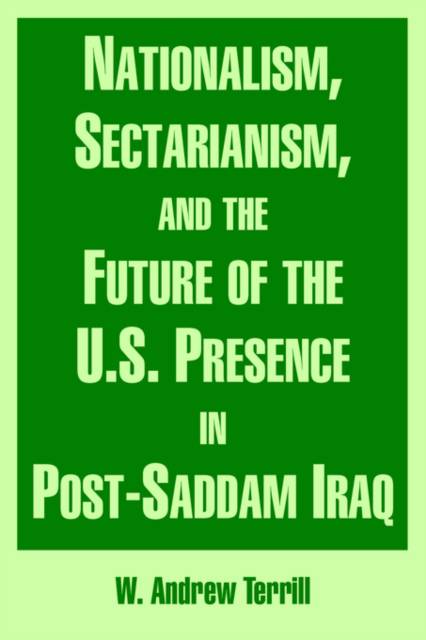
Bedankt voor het vertrouwen het afgelopen jaar! Om jou te bedanken bieden we GRATIS verzending (in België) aan op alles gedurende de hele maand januari.
- Afhalen na 1 uur in een winkel met voorraad
- Gratis thuislevering in België vanaf € 30
- Ruim aanbod met 7 miljoen producten
Bedankt voor het vertrouwen het afgelopen jaar! Om jou te bedanken bieden we GRATIS verzending (in België) aan op alles gedurende de hele maand januari.
- Afhalen na 1 uur in een winkel met voorraad
- Gratis thuislevering in België vanaf € 30
- Ruim aanbod met 7 miljoen producten
Zoeken
Nationalism, Sectarianism, and the Future of the U.S. Presence in Post-Saddam Iraq
W Andrew Terrill
Paperback | Engels
€ 23,45
+ 46 punten
Omschrijving
The destruction of the Saddam Hussein regime in Iraq has opened the path to a new future for Iraqis, although it is not yet certain what direction that future will take. Iraq is a fragile political entity created in the aftermath of World War I through the involuntary union of ethnically and religiously diverse portions of the former Ottoman Empire. In the years following Iraq's creation, a nascent nationalism emerged, which successive leaders sought to nurture and encourage. This effort culminated in Saddam Hussein's efforts to generate a radical Iraq-centered form of Arab nationalism, which served to promote loyalty to the state and more importantly to Saddam. The U.S.-Iraqi War of 2003 did not emerge as a strong test of Iraqi nationalism. While Saddam did have some committed defenders, large segments of the population remained neutral in the confrontation between the U.S.-led coalition and Saddam's defenders. After the war, the United States emerged as a power on probation with the Iraqi population, many of whom were uncertain that their well-being was a major factor in the U.S. decision to intervene and remain in Iraq. Anti-American conspiracy theories became widespread in Iraq, while conservative Muslims worried about the corrupting influence of perceived Western vices. The removal of Saddam's regime created problems and opportunities for Iraqi ethnic and religious communities. Arab Shi'ites, who comprise the majority of the population, saw new opportunities for political leadership, perhaps with a powerful but fragmented clergy leading the way. Sunni Arabs correspondingly worried about a new distribution of power, and many began to view de-Baathification as a process that further threatens their community. Kurds remain interested in de facto, but not formal, independence from Iraq, and the danger of an Arab backlash to Kurdish aspirations is correspondingly serious. Tribal identities further complicate the situation. Some attacks against U.S. forces have occurred following the war with most of the violence associated with residual Saddam loyalists from among the Sunni Arab community. Many Shi'ites are more reluctant to engage in such activity so long as it appears that they can take power by political means. Nevertheless, strong anti-U.S. views are present in the pro-Iranian Shi'ite organizations, and these views may spread among other Shi'ites over time. The possibility of confrontations between U.S. troops and hostile crowds is particularly worrisome as is the availability of massive quantities of weapons to the Iraqi population. In light of this situation, the United States needs to search continually for areas of agreement with the nonextremist clergy while also recognizing issues on which collaboration is not possible. U.S. leaders must also support a continued strong information campaign, expand efforts to challenge Iranian activities in Iraq, and provide troops with extensive training in stabilization and occupation duties. The participation of troops from moderate Arab and Muslim states in stabilization and reconstruction activities is important and should be encouraged. U.S. administrators must also be careful how they use the word de-Baathification since some Baath ideals are not inherently anti-democratic, although the party itself was deeply corrupted by Saddam. Finally, any U.S. efforts to achieve long-term dominance of Iraqi politics can be expected to produce a serious backlash.
Specificaties
Betrokkenen
- Auteur(s):
- Uitgeverij:
Inhoud
- Aantal bladzijden:
- 56
- Taal:
- Engels
Eigenschappen
- Productcode (EAN):
- 9781410217479
- Verschijningsdatum:
- 13/10/2004
- Uitvoering:
- Paperback
- Formaat:
- Trade paperback (VS)
- Afmetingen:
- 152 mm x 229 mm
- Gewicht:
- 95 g

Alleen bij Standaard Boekhandel
+ 46 punten op je klantenkaart van Standaard Boekhandel
Beoordelingen
We publiceren alleen reviews die voldoen aan de voorwaarden voor reviews. Bekijk onze voorwaarden voor reviews.









